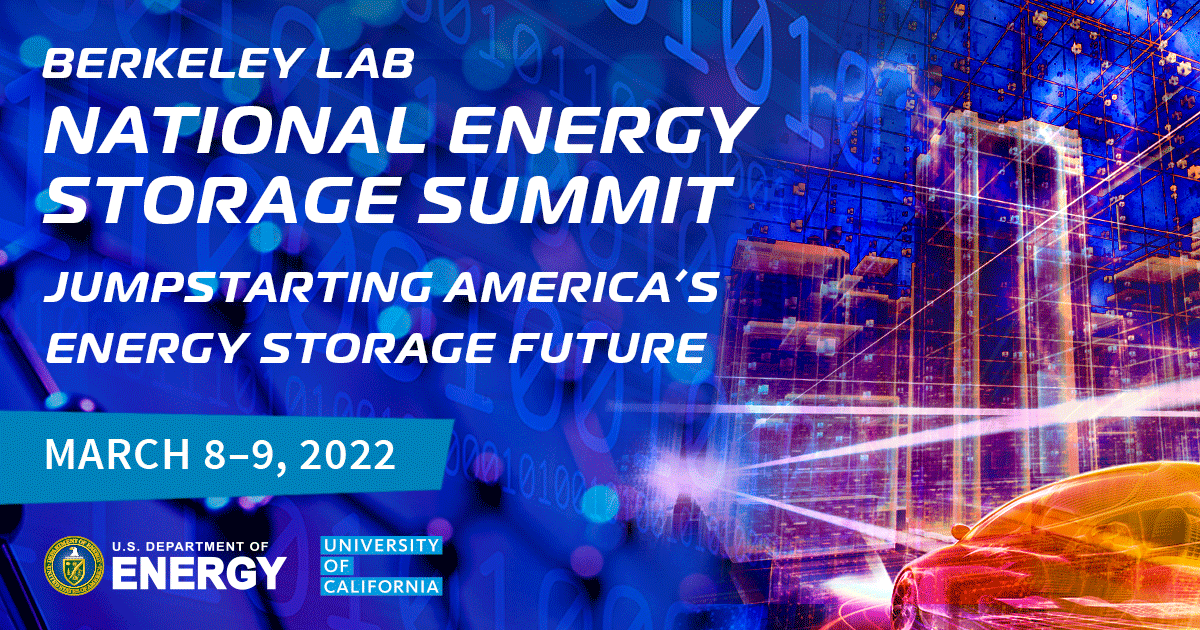
On March 8 and 9, Lawrence Berkeley National Laboratory (Berkeley Lab) is hosting the National Energy Storage Summit, a virtual public event that will connect thought leaders across industry, government, communities, and the research enterprise to catalyze partnerships and accelerate solutions around specific challenges to America’s energy storage future.
Exponential energy storage deployment is both expected and needed in the coming decades, enabling our nation’s just transition to a clean, affordable, and resilient energy future. Attendees of the two-day summit will collaboratively explore how to make this future a reality in support of the nation’s decarbonization goals.
The March 8 session, entitled America’s Battery Production Revolution: From Resource to Recharge, will focus on leveraging policy, markets, and science and technical innovations across materials, supply chains including lithium, and production processes to revolutionize a domestic battery ecosystem and realize America’s full potential, with implications for creating equitable clean-energy jobs and supporting national security.
The March 9 session, entitled Driving Accelerated Energy Storage Discovery-to-Deployment for Decarbonization, will expand the annual Bay Area Battery Summit ecosystem to a national stage, in partnership with New Energy Nexus, SLAC National Accelerator Lab, and Lawrence Livermore National Lab. The agenda will focus on bridging the diverse stakeholders — across science to systems — to accelerate equitable national energy storage deployment in all relevant sectors: the evolving grid, energy-intense industry, resilience, transportation, and buildings. The focus will broaden beyond batteries to include energy storage at large.
Featured speakers for the two-day event include U.S. Energy Secretary Jennifer Granholm; Geri Richmond, Under Secretary of Science and Innovation at the Department of Energy; Sameera Fazili, Deputy Director of the White House National Economic Council; Monica Gorman, Deputy Assistant Secretary for Manufacturing; Joe Bryan, Chief Sustainability Officer for the U.S. Department of Defense; Jignasa Gadani, Director of the Office of Energy Policy and Innovation at the Federal Energy Regulatory Commission; Celina Mikolajczak, Chief Manufacturing Officer at QuantumScape; Sergio Coronado, Senior VP at Duracell; Rachael Nealer of the new Joint Office for Energy and Transportation; Ilka von Dalwigk, Policy Manager at InnoEnergy and European Battery Alliance; Tony Reames, Senior Advisor on Energy Justice at Department of Energy; and many more.
In addition, don’t miss an in-orbit conversation with astronaut Kayla Barron from the International Space Station. She’ll discuss what it’s like to live and work on the orbiting research platform, how energy storage technology has powered the space station for more than 20 years, and how researchers can utilize this one-of-a-kind outpost to advance the nation’s energy storage capabilities.
“It is critical to bring together the nation’s innovation ecosystem to accelerate energy storage research, development, and deployment,” said Berkeley Lab Director Mike Witherell. “The National Energy Storage Summit’s goal is to jumpstart the kinds of partnerships that lead to new solutions.”
“Our event will catalyze collaborations across national labs, industry, academia, policy makers, and beyond in support of the nation’s decarbonization goals — so come prepared to share, connect, and engage,” said Noël Bakhtian, executive director of Berkeley Lab’s Energy Storage Center, which harnesses the expertise and capabilities throughout the Lab to accelerate real-world solutions. The Energy Storage Center brings together more than 100 Berkeley Lab researchers to conduct pioneering work across the entire energy storage landscape, from discovery science to applied research, deployment, analysis, and policy research.
National Energy Storage Summit attendees will have many ways to engage with other attendees and explore partnership opportunities. A March 9 virtual pitchfest will provide everyone an opportunity to share their innovative ideas with an audience of researchers and attendees from industry, government, and the news media. The conference will also host an energy storage virtual showcase, which will enable participants to spotlight their capabilities, IP, and start-up companies. The collaboration cycles on Day 2 will enable participants to explore new collaborations with attendees and accelerate their ideas via the collaboration seed fund. Additionally, attendees will be incentivized to engage across these modes to win raffle prizes such a one-on-one coffee with DOE’s Deputy Secretary or a Nobel Prize winner.
# # #
Founded in 1931 on the belief that the biggest scientific challenges are best addressed by teams, Lawrence Berkeley National Laboratory and its scientists have been recognized with 14 Nobel Prizes. Today, Berkeley Lab researchers develop sustainable energy and environmental solutions, create useful new materials, advance the frontiers of computing, and probe the mysteries of life, matter, and the universe. Scientists from around the world rely on the Lab’s facilities for their own discovery science. Berkeley Lab is a multiprogram national laboratory, managed by the University of California for the U.S. Department of Energy’s Office of Science.
DOE’s Office of Science is the single largest supporter of basic research in the physical sciences in the United States, and is working to address some of the most pressing challenges of our time. For more information, please visit energy.gov/science.